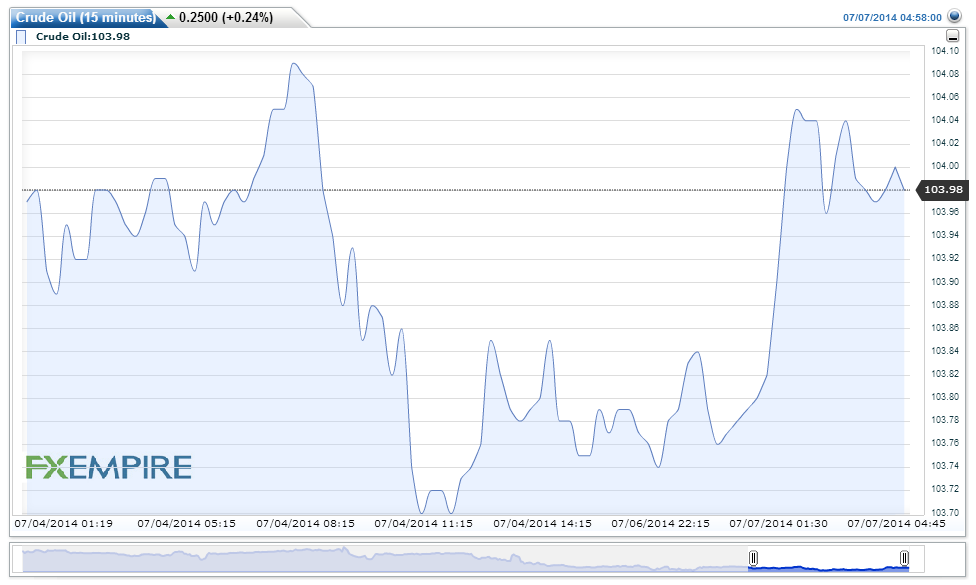Brent Oil gained 20 points this morning to trade at 110.79 on news that the Ukraine government routed Pro-Russian separatists over the weekend, which might mean the a truce and cease fire negotiations might be delayed. Crude Oil also gained 26 points to reach 104.03. Brent traded near the lowest price in more than three weeks as Libya prepares to increase exports and amid speculation that Iraq’s crude supplies remain safe from violence. WTI was 7 cents lower from the July 3 close at $103.99 a barrel in electronic trading on the New York Mercantile Exchange. There was no floor trading during the Fourth of July holiday and transactions will be booked today for settlement purposes.
Brent prices eased 2.4 percent last week, erasing this year’s gains, as rebels seeking self-rule in Libya’s east agreed to surrender the Es Sider and Ras Lanuf ports, the nation’s biggest and third-largest export terminals. The government in Tripoli has instructed National Oil to start marketing supplies from the two facilities. Es Sider can load 340,000 barrels a day while Ras Lanuf can handle 220,000 barrels, according to the Oil Ministry. Libya pumped 300,000 barrels a day last month, compared with 1.13 million in June 2013, ranking it as the smallest producer in the Organization of Petroleum Exporting Countries, data compiled by Bloomberg show.
Oil prices were mixed this morning as dealers weigh easing concerns about the jihadist insurgency in Iraq with upbeat sentiment about US demand following strong jobs data. The rebel group has overrun swathes of Iraq and is close to Baghdad following a lightning offensive since June 9, displacing hundreds of thousands of people and initially alarming global oil markets.
After nearly four weeks of fighting with government forces, however, the group has yet to directly threaten the key oil-producing region in the country’s south.
Iraq is the second biggest producer in the 12-nation OPEC oil cartel, pumping 3.4 million barrels a day and possessing more than 11 per cent of the world’s proven reserves. Iraq is one of the world’s top oil exporters, so you would think that a recent attack by militants on its largest oil refinery amid a deteriorating security situation in the country would prompt global fears of oil shortages and spark a spike in prices. Instead, prices are about where they were a year ago, although they have been creeping up in recent months. The insurgency is not expected to reach Iraq’s main oil producing fields in the south and in Kurdish-controlled areas in the north any time soon, but in the long term “infrastructure, as well as producing assets, will be a tempting target if the ISIS offensive moves into higher gear. Despite objections from Baghdad, the Kurdish government plans to export oil directly to Turkey, the only way it believes it can get a fair share of the country’s oil wealth.

Natural Gas continued to ease this morning dropping by 37 points to trade at 4.332 as residential demand remained stable with the US weather outlook remaining at the bottom of seasonal expectations. July Fourth often marks a time when traders form a consensus about summer weather. A wave of higher temperatures is coming early next week in the West and South, and that could lead to more demand for natural gas to fuel electric power and air conditioning, analysts said. The EIA’s storage update showed 100 billion cubic feet of natural gas was added to stockpiles in the week ended June 27. That is 1 bcf lower than analysts’ expectations. The injection marks the eighth straight week that natural-gas stocks have increased by 100 bcf or more, bringing total gas in storage to 1,929 bcf, down 26% from the stocks of 2,595 bcf last year at this time and down 29% from the five-year average of 2,719 bcf.
